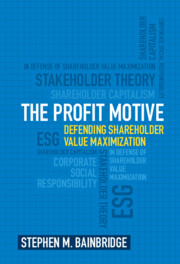Book contents
- The Profit Motive
- The Profit Motive
- Copyright page
- Dedication
- Contents
- Acknowledgments
- Editorial Note
- Introduction
- Part I The Law
- 1 The Battle of River Rouge
- 2 Fireplug Funding for Princeton
- 3 Why Didn’t the Cubs Have to Play Night Baseball?
- 4 Defending Dodge
- 5 To Make Stakeholder Capitalism the Rule, You Would Have to Change Most of Corporate Law
- 6 What about the Benefit Corporation?
- Part II The Merits
- Conclusion
- Notes
- Index
5 - To Make Stakeholder Capitalism the Rule, You Would Have to Change Most of Corporate Law
from Part I - The Law
Published online by Cambridge University Press: 02 February 2023
- The Profit Motive
- The Profit Motive
- Copyright page
- Dedication
- Contents
- Acknowledgments
- Editorial Note
- Introduction
- Part I The Law
- 1 The Battle of River Rouge
- 2 Fireplug Funding for Princeton
- 3 Why Didn’t the Cubs Have to Play Night Baseball?
- 4 Defending Dodge
- 5 To Make Stakeholder Capitalism the Rule, You Would Have to Change Most of Corporate Law
- 6 What about the Benefit Corporation?
- Part II The Merits
- Conclusion
- Notes
- Index
Summary
Proponents of stakeholder capitalism claim that it can be implemented simply by modifying the fiduciary duties of directors so that they can take into account the interests of stakeholders rather than being legally limited to considering shareholder value maximization. Such claims fundamentally misunderstand how deeply embedded shareholder value maximization is in corporate law. Only shareholders get to vote, which means directors get to keep their jobs only if they please shareholders. A web of director and officer fiduciary duties inclines them to shareholder value maximization, as does the law of executive compensation.
- Type
- Chapter
- Information
- The Profit MotiveDefending Shareholder Value Maximization, pp. 73 - 78Publisher: Cambridge University PressPrint publication year: 2023

